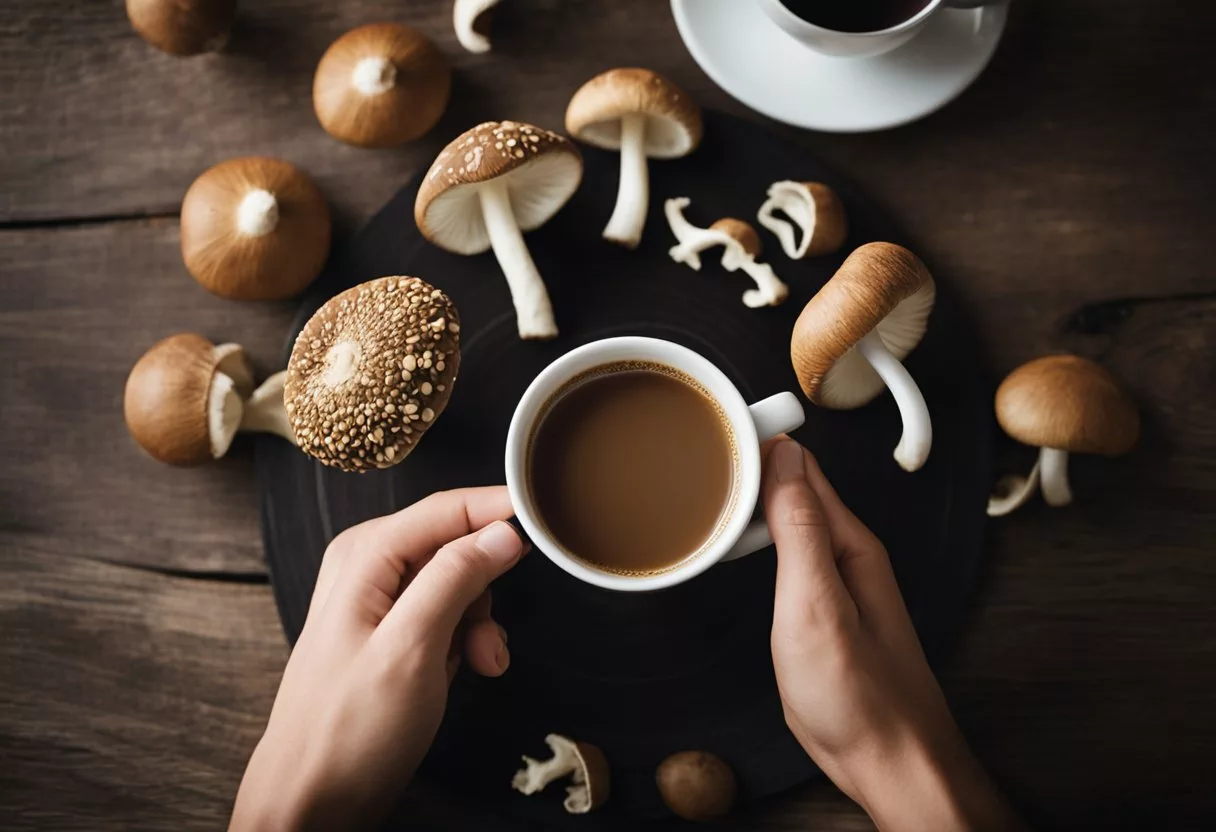Mushroom coffee is gaining traction as a trendy alternative to traditional coffee. It combines the well-loved ritual of coffee consumption with the reputed health benefits of medicinal mushrooms. The difference lies in the ingredients; while traditional coffee solely relies on coffee beans, mushroom coffee includes powdered medicinal mushrooms. This fusion is believed to offer a unique set of advantages.

In the arena of health and wellness, mushroom coffee is often associated with added benefits, including improved sleep, reduced stress, and enhanced immune function. The underlying premise is that mushrooms like chaga, lion’s mane, and reishi carry adaptogenic properties that might help the body to better manage physiological stress. Despite these claims, skeptics argue the need for concrete scientific research to validate such benefits.
The sensory experience of drinking mushroom coffee also differs. Described as earthier and with a more complex aroma, it provides an alternative for those who enjoy nuanced flavors in their coffee. However, it’s essential to consider that the brewing process and the proportion of mushroom to coffee will significantly influence both the taste and potency of the final beverage.
Overview of Mushroom Coffee

Mushroom coffee is an innovative blend that combines ground coffee beans with powdered medicinal mushrooms. Noted for its potential health benefits, this beverage is gaining popularity as an alternative to traditional coffee.
Origin and History
The practice of infusing coffee with medicinal mushrooms has roots in traditional medicine, particularly within Asian cultures. These functional mushrooms, such as reishi, chaga, cordyceps, lion’s mane, and turkey tail, have been used for centuries for their perceived health benefits. The infusion of these mushrooms into coffee is a more recent trend, catering to a modern audience looking for wellness-focused alternatives to their daily brew.
Key Components
| Mushroom Coffee Component | Benefits |
|---|---|
| Extracts of Medicinal Mushrooms | Believed to provide immune support and cognitive enhancement |
| Functional Mushrooms like lion’s mane and cordyceps | May improve focus and energy levels |
| Traditional Coffee Beans | Provide familiar taste and caffeine |
Every cup of mushroom coffee typically contains both the rich flavor of coffee and the earthy tones of mushrooms. Extracts from medicinal mushrooms are added in the form of a fine powder, which dissolves when brewed, without fundamentally altering the coffee experience. Each species of mushroom brings a different profile of benefits, from the immunity-boosting properties of turkey tail to the stress-reducing effects of reishi.
Overview of Traditional Coffee

Traditional coffee, a beloved beverage enjoyed globally, traces its rich heritage through a meticulous process of cultivation and a complex composition that appeals to a wide audience.
Coffee Cultivation
Coffee cultivation takes place in the equatorial regions known as the “Bean Belt,” where the climatic conditions are ideal for growing coffee plants, predominantly the Coffea arabica species. Arabica coffee beans are prized for their smoother and more flavorful profile. The process involves planting young coffee trees in shaded nurseries, and after a year, the seedlings are moved to open fields. It generally takes three to four years for a coffee tree to begin bearing fruit, often called “cherries,” which are handpicked for the highest quality.
Coffee Composition
The composition of traditional coffee is both complex and fascinating. The beans themselves are seeds within the coffee cherries that, once extracted and dried, are roasted to varying levels depending on the desired flavor profile. Roasting transforms the physical and chemical properties of the green coffee beans into the aromatic coffee beans that are ground for brewing. These ground coffee beans are rich in caffeine, a natural stimulant that contributes to coffee’s energizing effects. Coffee’s flavor profile includes a balance of acidity, body, and aroma that differs from region to region due to the distinct characteristics of the soil and climate.
Comparison of Benefits

In considering mushroom coffee versus traditional coffee, one should examine the variances in health and nutritional content, as well as their respective impacts on mental and cognitive functions.
Health and Nutritional Benefits
Mushroom coffee is emerging as a beverage that combines the benefits of medicinal mushrooms with the familiar kick of caffeine. It is noted for having less caffeine, which makes it a suitable alternative for those sensitive to the effects of a traditional coffee’s caffeine content. The integration of medicinal mushrooms into the coffee mix is said to provide a unique set of nutritional benefits, including immune support due to the presence of polysaccharides found in mushrooms. These adaptogens are agents that help the body resist stressors of all kinds, whether physical or chemical, and can support overall immune function.
- Antioxidants & Adaptogens: Antioxidants are present in both beverages, but mushroom coffee incorporates adaptogenic compounds that may contribute to immune health.
- Vitamins & Minerals: Traditional coffee offers a small amount of B-vitamins and minerals, whereas mushroom coffee can include additional nutrients derived from mushrooms, though the specific amounts can vary widely depending on the mushroom species used.
Mental and Cognitive Effects
The cognitive impacts of traditional coffee are primarily attributed to its caffeine content, enhancing alertness, concentration, and short-term memory. However, mushroom coffee might offer a different cognitive experience. The mushrooms used in mushroom coffee often include varieties such as Lion’s Mane and Chaga, which have been associated with potential benefits for brain health due to their neuroprotective properties.
- Energy: Coffee is well-known for its energy-boosting effects, but mushroom coffee may provide a more balanced energy lift without the jitteriness sometimes associated with caffeine.
- Concentration & Memory: Traditional coffee enhances concentration levels, but mushroom coffee’s adaptogens might offer more sustained mental clarity and could be beneficial for memory as well.
Taste and Aromas

When comparing mushroom coffee with traditional coffee, one notices significant differences in both taste and aromas. These differences arise from the unique ingredients and brewing techniques of each type of coffee.
Flavor Profiles
Mushroom coffee combines the bold qualities of coffee beans with the earthy flavors of medicinal mushrooms, creating a distinct taste complexity. This type of coffee often has a smoother taste with muted bitterness, and compared to regular coffee, it carries a milder caffeine punch. Commonly used mushrooms like chaga and reishi infuse subtle flavors, which are described by some as a woodsy and nutty addition to the rich aroma of traditional coffee. In contrast, regular coffee is known for its strong, acidic profile with a pronounced bitterness that can vary depending on the bean origin and roasting level.
Consumer Preferences
Those who lean towards mushroom coffee often appreciate the unique blend of earthy flavors that come from the mushrooms, finding it a refreshing departure from the intensity of regular coffee. This variant can offer a less overwhelming aroma and is sometimes preferred by those sensitive to the robust scent of traditional brews. Conversely, die-hard coffee aficionados typically maintain their loyalty to the potent, invigorating aroma of traditional coffee, cherishing the classic taste that has become an integral part of their food experience. The preferences are as varied as the consumers themselves, with some embracing the novel fusion found in mushroom coffee, while others remain staunch advocates of the familiar and time-tested profiles of their usual coffee experiences.
Effects on Well-being

When comparing the effects of mushroom coffee and traditional coffee on well-being, key distinctions arise in their impact on stress management and immune support. These differences can be attributed to the unique components found in mushroom extracts.
Stress and Anxiety Management
Mushroom coffee is often associated with anxiolytic effects due to the presence of adaptogens in certain mushroom species. Adaptogens aid in the body’s stress response, potentially helping to reduce stress levels. For instance, the reishi mushroom, commonly found in mushroom coffee blends, is credited with properties that may help manage stress and anxiety. Traditional coffee, on the other hand, contains higher levels of caffeine, which can increase cortisol levels and potentially exacerbate feelings of anxiety in sensitive individuals.
Immunity and Health Conditions
Another area where mushroom coffee stands out is in its purported immune-boosting properties. Mushrooms such as chaga and lion’s mane are known for their high levels of antioxidants. These antioxidants can assist in reducing oxidative stress and inflammation.
This is particularly relevant as chronic inflammation has been linked to several health conditions, including heart disease and allergies. In contrast, traditional coffee provides antioxidants primarily through its caffeine content and does not contain the immunomodulating compounds found in medicinal mushrooms.
Consumption and Preparation

Mushroom coffee and traditional coffee vary in their preparation and ingredients, offering distinct flavors and nutritional profiles to consumers.
Brewing Methods
When brewing mushroom coffee, the process often involves the use of mushroom powder, which is typically mixed with ground coffee beans. The mushroom component can come from different medicinal mushrooms and is often available in a finely ground form that allows for easy infusion with coffee.
Consumers typically prepare it by adding hot water, similarly to instant coffee, or by using a coffee maker if it’s pre-blended with coffee beans. For traditional coffee, the brewing methods are more varied, ranging from drip coffee makers, espresso machines to French presses. The choice of brewing technique can influence the strength and flavor of the coffee.
- Mushroom Coffee:
- Mix mushroom powder and ground coffee beans.
- Utilize typical coffee-making equipment.
- Available as instant or whole-bean blends.
- Traditional Coffee:
- Numerous methods: drip, espresso, pour-over, French press.
- Ground coffee beans as the primary ingredient.
- Adjust water ratio and brewing time for desired strength.
Additional Ingredients
Both mushroom and traditional coffees can incorporate various additional ingredients according to the consumer’s preference. Popular additions like creamer and sugar can enhance both types of coffee.
Some mushroom coffees may come pre-blended with herbal extracts that can add additional flavors and potential health benefits. It’s not uncommon to see mushroom coffee offerings boosted with fibers or other nutrients to highlight the health-conscious angle of the beverage.
- Mushroom Coffee:
- May contain extracts for flavor and health benefits.
- Fiber may be added for digestive health.
- Customizable with creamer and sugar.
- Traditional Coffee:
- Often enjoyed with creamer and/or sugar.
- Flavor can be customized with syrups or spices.
- Array of commercial creamer flavors available.
Market Considerations

In assessing the landscape for mushroom coffee versus traditional coffee, it is important to consider how availability, accessibility, and cost influence consumer choices.
Availability and Accessibility
Mushroom coffee, an innovative blend of ground mushrooms and coffee beans, has seen a steady rise in its market share. Initially more niche, its presence has expanded due to increasing health and wellness trends and promotion by health professionals, including registered dietitians. These products are now more accessible through health food stores, online retailers, and social media platforms, where they often gain traction.
Traditional coffee remains highly accessible globally, with an established supply chain that makes it available in a multitude of formats and venues, from grocery stores to cafes.
Cost Comparison
When considering the cost, mushroom coffee is generally more expensive than traditional coffee. This can be attributed to the perceived health benefits and the use of medicinal mushrooms, which can add to production costs.
A financial analysis suggests that the premium pricing may be a barrier to some consumers, particularly those in regions with lower disposable incomes. In contrast, traditional coffee is often less costly, making it a staple in many households.
- Mushroom Coffee: Estimated at USD 2.95 Billion in 2023 with an expected CAGR of 5.5%, reaching USD 4.15 Billion by 2030.
- Traditional Coffee: Continues to dominate the market due to its long-standing popularity and affordability.
Potential Risks and Considerations

When exploring the differences between mushroom coffee and traditional coffee, it’s important to consider the potential risks and adverse reactions as well as the need for consultation with healthcare providers, especially for those with pre-existing conditions or sensitivities.
Side Effects and Interactions
Mushroom coffee, while often lower in caffeine, may still produce caffeine-related side effects such as anxiety, rapid heart rate, or digestive issues, especially in those who are caffeine-sensitive. Certain mushrooms also carry their own risk of side effects.
For instance, reishi mushrooms can cause dizziness and upset stomach while other medicinal mushrooms may interact with medication or exacerbate pre-existing conditions.
- Caffeine content: Generally milder than regular coffee, mushroom coffee may still lead to caffeine overdose if consumed in excess.
- Adaptogenic properties: Some mushrooms help reduce anxiety and promote gut health, but individual reactions can vary significantly.
Consulting Healthcare Providers
Before making mushroom coffee a regular part of one’s diet, consulting with a healthcare provider is recommended, especially for those with underlying health issues.
They can provide guidance on whether mushroom coffee is an appropriate choice for achieving a balanced diet and may help with specific dietary guidelines or restrictions related to one’s health.
- Individuals with caffeine sensitivity should discuss potential alternatives with their healthcare provider.
- Those with a medical history of digestive issues may require a tailored approach to incorporating mushroom coffee into their routine.
Coffee in Culture and Society

Coffee’s journey through cultures has secured its role not just as a beverage but also as a marker of societal practices and evolving trends. From ancient rituals to modern café lifestyles, coffee is intertwined with health, wellness, and social behaviors.
Traditional Use and Perceptions
Traditional Chinese Medicine (TCM) has long recognized various herbal remedies, including types of mushrooms that are now shared in the global health scene. Mushrooms once relegated to TCM are finding their way into Western wellness practices through unique blends like Ryze Mushroom Coffee and Four Sigmatic, marrying the old with the new.
These brews are perceived not only as healthful elixirs but also as means to foster a balanced lifestyle.
Modern Trends and Popularity
In today’s fast-paced world, the popularity of coffee has been magnified through social media. Photogenic lattes and specialty beverages like MUD\WTR often take center stage on platforms such as Instagram and Facebook.
Health-conscious consumers are increasingly drawn to these alternatives, which offer purported wellness benefits and lower caffeine content.
The convergence of health trends and café culture has propelled products like mushroom coffee into the limelight, symbolizing the modern individual’s desire for both social engagement and health and wellness.
Environmental and Ethical Impacts

The production of mushroom coffee is often lauded for its environmental benefits and ethical advantages over traditional coffee cultivation. These improvements are mainly in the areas of sustainability and fair labor practices.
Sustainable Practices
Mushroom coffee tends to be more ecologically sustainable than traditional coffee. The processes involved in growing mushrooms require less water and do not necessitate deforestation, which is a significant issue with traditional coffee cultivation.
These fungi typically grow on agricultural waste products, converting what would be waste into a valuable commodity. Additionally, mushroom coffee brands often adopt natural farming practices that enhance the well-being of the environment.
- Water Use: Traditionally, coffee cultivation is water-intensive, but mushrooms require minimal water, reducing the strain on water resources.
- Land Use: Traditional coffee can contribute to deforestation, whereas mushrooms can be grown on existing agricultural waste.
- Carbon Footprint: The carbon footprint is, consequently, lower for mushroom coffee due to the reduced water and land use.
Ethical Sourcing
Ethical considerations are integral to the sourcing of mushroom coffee. These ethical practices focus on uplifting the communities involved in its production.
Fair labor practices ensure that the workers receive adequate compensation, which has a ripple effect on their access to education, healthcare, and general well-being.
This emphasis on fair treatment of workers makes the cultivation and sale of mushroom coffee ethical beyond the individual worker level, in contrast to certain conventional coffee farming practices that have been criticized for poor labor conditions.
- Worker Welfare: Mushroom coffee producers often advocate for fair wages and improved living standards for their workers.
- Community Development: Ethical sourcing policies contribute to the social and economic development of farming communities.
Future of Coffee Consumption

As consumers become more health-conscious, the coffee industry is adapting with innovations that align with health trends and changing demands. There is a notable shift towards products offering more than just a caffeine boost, reflecting a deeper interest in holistic well-being and nutrient-rich offerings.
Innovations in Coffee Products
The emergence of mushroom coffee combines traditional coffee with medicinal mushrooms. This fusion capitalizes on the demand for beverages that not only energize but also provide wellness advantages.
One example of this trend is the incorporation of mushrooms such as Cordyceps. They are believed to offer natural and sustained energy, without the typical caffeine crash associated with regular coffee.
Alongside mushrooms, other plant proteins and supplements are being integrated into coffee products to meet consumer desire for functional foods.
These enhanced coffees often include proteins, antioxidants, and vitamins, aligning coffee consumption with health objectives.
Changing Consumer Demands
Consumers are increasingly seeking coffee options that align with their health trends and lifestyle choices. There’s a growing appetite for coffee that provides additional health benefits—such as those with added superfoods and supplements—without compromising on taste.
The market is responding with a diverse range of products, from mushroom coffee with its heralded health benefits to options lower in caffeine and tailored to those with dietary restrictions.
Moreover, mushroom coffee is not merely a trend but is viewed by some as part of the future of coffee consumption, suggesting a longevity to this phenomenon.
As the public becomes more educated on the effects of their consumption choices, they are responsible for shaping a market that prioritizes both health and the environment. This could potentially propel mushroom coffee and other innovative coffee blends well into the future.
Conclusion

When examining mushroom coffee versus traditional coffee, each presents unique characteristics and benefits that appeal to different preferences.
Mushroom coffee is often highlighted for being lower in caffeine, with estimates suggesting around 40-50 mg of caffeine per serving compared to traditional coffee’s approximate 95 mg. This reduced caffeine content positions it as a potential option for those sensitive to caffeine or looking for a milder energy boost.
The flavor profile of mushroom coffee is distinct, infusing the earthy notes of medicinal mushrooms with the boldness of coffee beans. This results in an aromatic experience that some consumers find enticing.
It also taps into the interest in functional beverages due to its known health benefits, which could include improved focus and potential immune-boosting effects.
Traditional coffee, on the other hand, remains a timeless choice with its robust flavor and consistent caffeine kick. It holds a significant cultural presence and is deeply ingrained in many daily routines.
Therefore, individuals’ decision between the two often comes down to personal health considerations, taste preference, and desired caffeine intake. Neither beverage emerges as the superior option universally; rather, they cater to different desires within the coffee-drinking community.
Those intrigued by nuanced flavors and wellness trends may lean towards mushroom coffee, while traditionalists and those seeking a stronger caffeine effect may stick with regular coffee.
Frequently Asked Questions

This section provides clear answers to common queries regarding mushroom coffee and how it compares to traditional coffee.
What are the taste differences between mushroom coffee and traditional coffee?
Mushroom coffee typically presents a unique, earthy flavor profile that is different from traditional coffee. Its taste is infused with the distinctive aroma of medicinal mushrooms, creating a rich and complex aroma that some coffee enthusiasts find appealing.
What are the nutritional differences between mushroom coffee and traditional coffee?
Nutritionally, mushroom coffee is often highlighted for its potential health benefits, such as immune support, though both mushroom and traditional coffee can be enhanced with add-ins like milk or sweeteners. However, some of these add-ins may increase the calorie count.
Does mushroom coffee offer the same caffeine benefits as traditional coffee?
Mushroom coffee blends are usually lower in caffeine compared to traditional coffee. While mushroom powders don’t naturally contain caffeine, many blends do include coffee beans to add both flavor and caffeine content.
Are there any known side effects associated with drinking mushroom coffee?
Individuals with mushroom allergies or hypersensitivity might experience adverse reactions to mushroom coffee. These symptoms include cough, nausea, and difficulty breathing. It’s important for those with sensitivities to exercise caution or avoid mushroom coffee due to potential side effects.
Can mushroom coffee be considered a healthier alternative to traditional coffee?
The perceived health benefits of mushroom coffee, such as its adaptogenic properties or lower caffeine content, lead some to consider it a healthier option. However, health outcomes can vary widely between individuals, and mushroom allergies should be taken into account.
How does the preparation of mushroom coffee differ from that of traditional coffee?
The preparation of mushroom coffee often involves blending ground medicinal mushrooms with coffee beans. The overall brewing process is similar to that of traditional coffee. However, the focus is on creating a balance between the mushroom’s earthy notes and the coffee’s robust flavor.
This preparation can result in a beverage with about half as much caffeine as regular coffee.